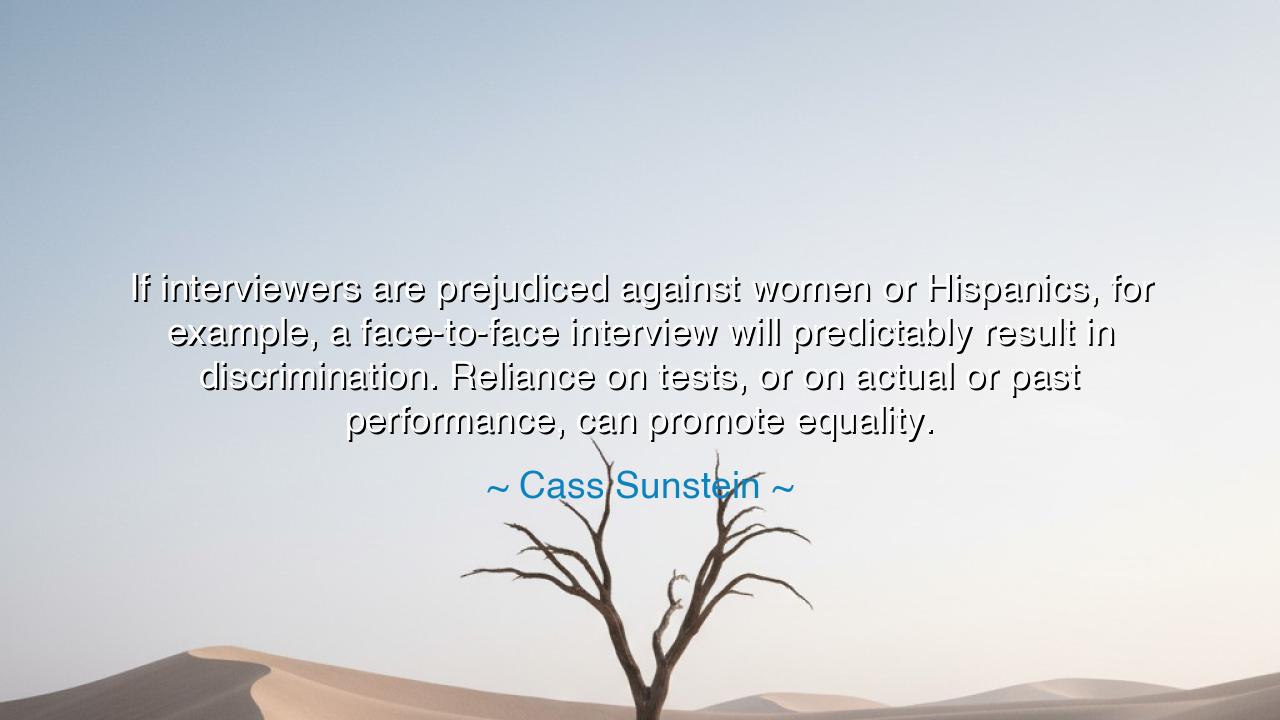
If interviewers are prejudiced against women or Hispanics, for
If interviewers are prejudiced against women or Hispanics, for example, a face-to-face interview will predictably result in discrimination. Reliance on tests, or on actual or past performance, can promote equality.






“If interviewers are prejudiced against women or Hispanics, for example, a face-to-face interview will predictably result in discrimination. Reliance on tests, or on actual or past performance, can promote equality.” — Cass Sunstein
In this declaration, Cass Sunstein unveils a truth as old as civilization itself: that human judgment, though powerful, is often clouded by unseen bias. He speaks of prejudice not as an act of deliberate cruelty, but as a shadow that lingers within the human heart — a distortion of vision that turns fairness into favoritism, and potential into lost opportunity. When he warns that a “face-to-face interview” can result in discrimination, he calls attention to one of humanity’s deepest struggles: the conflict between what is seen and what is true.
Since the earliest days of society, people have sought to measure worth — of warriors, artisans, scholars, and rulers. Yet the methods of judgment have often been corrupted by perception. The ancients once believed that nobility was seen in blood, beauty in skin, and wisdom in lineage. But as empires rose and fell, the wise began to see that these measures were hollow. The truest value of a person lies not in appearance or name, but in deed and ability. Sunstein’s call to rely on tests, performance, and proven action echoes this timeless lesson: that justice must be guided by evidence, not emotion; by truth, not tradition.
Consider the story of Katherine Johnson, the brilliant African-American mathematician whose calculations guided NASA’s first human flights into space. In her time, the doors of science were guarded by prejudice. Many saw her gender and her race as barriers rather than blessings. Yet it was her performance, her unshakable precision, that shattered the illusions of bias. Numbers could not lie, and in the language of mathematics, her brilliance was undeniable. Johnson’s triumph became a testament to Sunstein’s wisdom — that when judgment rests on measurable merit rather than human bias, equality has a chance to bloom.
Sunstein’s words also speak to the subtle dangers of familiarity. A face-to-face interview, while seemingly fair, can become a mirror reflecting the interviewer’s own likeness. People often favor those who look, sound, or think like themselves — not out of malice, but out of habit. This is the quiet poison of bias: it hides behind good intentions, masquerading as “instinct” or “fit.” To rely on objective measures, then, is to strip away illusion and see the person as they are, not as we expect them to be. Such impartiality is not cold — it is sacred, for it honors truth above comfort.
The ancients taught that justice must be blind, holding her scales without regard for who stands before her. In modern times, Sunstein reminds us that justice must also be deaf to prejudice, hearing only the voice of performance, effort, and proven worth. When society builds systems that evaluate through evidence — through results, through deeds, through character revealed in action — it draws closer to the ideal of equality that every generation has pursued but few have perfected.
Yet this teaching extends beyond the workplace. It touches the heart of how we see one another in all walks of life. Whether in schools, courts, or communities, we are called to judge not by the surface of identity, but by the substance of contribution. The wise do not ask, “Who are you?” but “What have you done?” They do not ask, “Where are you from?” but “How have you served?” When we learn to see through the lens of fairness, the boundaries of race, gender, and background begin to fade, and humanity itself becomes the only measure that matters.
So let this lesson be written upon the hearts of all who seek to lead or to judge: cast away the veil of bias. Trust in truth that can be proven, in results that can be seen. Let your fairness be founded on fact, not feeling. For prejudice, once accepted, builds walls that no wisdom can climb. But equality — born from impartial judgment — builds bridges that endure through time. In the great ledger of human progress, it is not perception that redeems us, but performance; not favor, but fairness; not power, but principle. These are the true tests by which justice, and the soul of civilization itself, must stand or fall.






AAdministratorAdministrator
Welcome, honored guests. Please leave a comment, we will respond soon